#national ms society
Text
September 23, 2023 10:00 am Oklahoma time.
Our MS Journey: A Black MS Community part 2 of 2.
Title: Mental Health and Self Advocacy
Speaker: Dr. Tirisham Gyang, Ohio State.
Host: The National MS Society
0 notes
Text

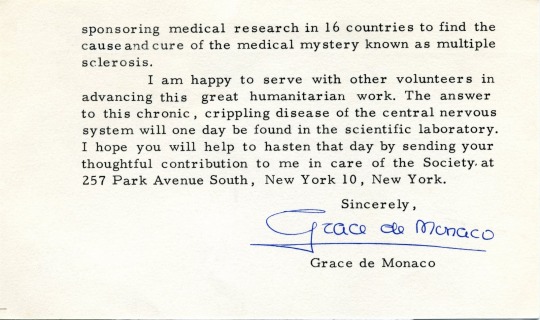
Letter from Princess Grace to the US National Multiple Sclerosis Society (unknown date).
0 notes
Text
What these freaks did to those kids is cruel and unusual.
Madagascar will surgically castrate paedophiles under new law approved by MPs it is revealed - days after Kazakhstan announced same plan
A minister spoke in favour of the law saying: 'society must know what they did'
By ED HOLT
PUBLISHED: 14:29 EST, 7 February 2024
Madagascar's parliament has approved a new law which will see paedophiles surgically castrated for their crimes.
The new law comes just days after Kazakhstan announced a similar law where the country's worst offending child sex offenders will have their genitals surgically removed.
On February 2 Madagascar's parliament, The National Assembly, approved a law which legalised the castration of child rapists.
The old law stated that those found guilty of raping a minor would face between five and 20 years of forced labour.
However, this new law states that those found guilty of raping a child under ten-years-old will be surgically castrated and sentenced to life imprisonment. While if the victim is between ten and 13-years-old, they will instead be chemically castrated and face 15 to 20 years of forced labour. If the rapist is also a minor they will escape castration.

Madagascar's Minister of Justice Landy Randriamanantenasoa spoke in favour of the bill. She said: 'Society must know what they did and who they are'
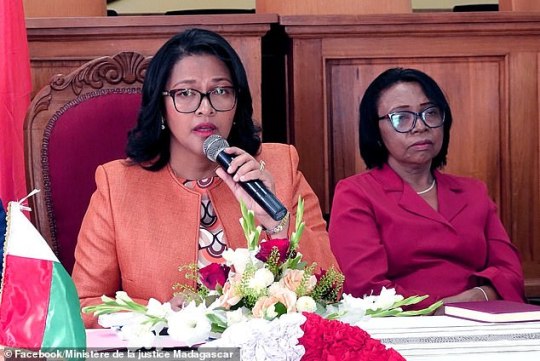
Ms Randriamanantenasoa has rebuked similar criticism about respect for human rights by saying Madagascar is a sovereign country. This comes after Amnesty criticised the bill
Minister of Justice Landy Randriamanantenasoa spoke in favour of the bill. Le Quotidien, a French language newspaper, reported that Ms Randriamanantenasoa said: 'Society must know what they did and who they are.'
The bill was proposed by the President of Madagascar, Andry Rajoelina, last month and was one of his key campaign promises during his re-election bid last year.
International organisations have criticised the new law. The BBC reports that in a statement, Tigere Chagutah, Amnesty's regional director for east and southern Africa, said: 'In Madagascar, rape cases remain under-reported, and perpetrators often go free due to the victims' and their families' fear of retaliation, stigmatisation, and a lack of trust in the judicial system.
'Implementing chemical and surgical castration, which constitutes cruel, inhuman and degrading treatment, as a punishment for those found guilty of raping minors will not solve this and is inconsistent with Malagasy constitutional provisions against torture and other ill-treatment, as well as regional and international human rights standards.'
Ms Randriamanantenasoa has rebuked similar criticism about respect for human rights by saying Madagascar is a sovereign country.

The tighten of the law in Kazakhstan follows the death of Erkezhan Nurmakhan, five, who was lured to a paedophile's house after he offered her money for an ice cream

Saidolim Gayibnazarov, 48, who had previous convictions, was sentenced to life in jail and chemical castration
Kazakhstan announced its own draft law to remove paedophiles genitals on February 6 following complaints from MPs that the current law where paedophiles are chemically castrated was not deterring child sex offenders.
The tighten of the law follows the death of Erkezhan Nurmakhan, five, who was lured to a paedophile's house after he offered her money for an ice cream.
Saidolim Gayibnazarov, 48, who had previous convictions, was sentenced to life in jail and chemical castration.
Deputy Interior Minister of Kazakhstan, Igor Lepikha, said surgical castration was 'controversial'.
'In terms of ethics and the human side of the issue it is very complicated indeed.
'Moreover, we speak about these criminals being locked up for life - so there is no point in [castration] then.'

#Madagascar#Kazakhstan#Madagascar's Minister of Justice Landy Randriamanantenasoa#President of Madagascar Andry Rajoelina#Of course Amnesty would criticised the bill#Shut up Tigere Chagutah#Rest In Peace Erkezha Nurmakhan age 5
439 notes
·
View notes
Text
The Commission of Inquiry on War Criminals, headed by Justice Jules Deschênes, completed an important report into its investigation on Holocaust war criminals living in Canada in 1986. It was accompanied by an assessment by scholar Alti Rodal, a document that Justice Deschênes said deserved “wide distribution.”
But it’s been 38 years, and we’re still waiting to read Ms. Rodal’s report as well as the full version of the Deschênes report itself. To this day, many Canadian Holocaust-related records and investigations are inaccessible[...]
The U.S. government provides researchers and the public various avenues of access to Holocaust records through its National Archives and the robust Freedom of Information Act, where scholars and others are empowered to access sensitive documents about Nazi war criminals who took refuge in the U.S. No such system exists in Canada, neither through Library and Archives Canada nor via the federal Access to Information Act.[...]
Most governments became aware of the hundreds, if not thousands, of potential war criminals living in their societies in the late 1970s and 80s, and Canada was no different. In response, Canada decided to conduct the Deschênes Commission, an internal two-year investigation tasked with finding out if and how Nazis found refuge in Canada. The final report, which was released publicly with extensive deletions, marked the premature end of investigations into hundreds of war criminals and called for the federal Justice and Immigration departments to take the lead on future prosecution.[...]
The post-Deschênes era has been a failure. The commission asked for 218 individuals to be investigated, and specifically targeted 20 “really bad guys,” as Ms. Rodal recently remarked. The 218 other cases were bad, too – they included gas chamber operators, policemen who shot thousands of Jews and murderers of Jewish children. The Canadian government has charged just four alleged Holocaust perpetrators over four decades, all of whom were acquitted. [...]
The fact that a soldier of the Third Reich was welcomed into the Canadian Parliament, and that there was such shock as to how this could happen, demonstrates how Canada has yet to confront its past relationship with Nazi war criminals in earnest. And perhaps the blanket denial of access to the nation’s own government records and investigations is an underlying cause. In response to the Yaroslav Hunka affair, the federal government has flirted with new disclosures. In October, Prime Minister Justin Trudeau remarked, “There are top public servants looking very carefully into the issue, including digging into the archives. We’re going to make recommendations.” Months have passed – we are still waiting.
27 Jan 24
#remember this?#this is the govt soooo concerned abt alleged participation by unrwa staffers in 7 oct btw#allegations extracted through '''''interrogation''''''
126 notes
·
View notes
Text




─ •✧ CATHERINE'S YEAR IN REVIEW : MAY ✧• ─
2 MAY - Princess Charlotte's 8th Birthday Portrait captured by Catherine was released by Kensington Palace.
3 MAY - Catherine, William and their children attended the Coronation Rehearsal.
4 MAY - Catherine and William travelled on the Elizabeth Line to Tottenham Court Road Station where they were received by Mr. Kevin Traverse-Healy (Deputy Lieutenant of Greater London). Afterwards, they visited the Dog and Duck Pub.
5 MAY - Catherine and William attended the Realm Governor-Generals and Prime Ministers Reception at Buckingham Palace. Afterwards, they joined The King in greeting the crowds at The Mall. Subsequently, they attended the Reception for Heads of State and Overseas Guests.
6 MAY - Catherine, William and their children attended the Coronation of The King and Queen in Westminster Abbey. Afterwards, they witnessed the RAF fly-past from the Palace Balcony.
7 MAY - Catherine and William attended the Coronation Big Lunch on the Long Walk. Later, they attended the BBC Coronation Concert and held a Reception following the Concert at Windsor Castle.
8 MAY - Catherine and were joined by their kids for the Big Help Out at 3rd Upton Scouts Hall. They appeared in the Coronation Portrait released by Buckingham Palace.
9 MAY - Catherine and William gave an Afternoon Garden Party at Buckingham Palace to celebrate the Coronation of The King and Queen.
11 MAY - Catherine received Professor Eamon McCrory (Board Member, the Royal Foundation Centre for Early Childhood Advisory Group) at Windsor Castle. Afterwards, they held a Meeting with Mrs. Alice Webb (Trustee, The Royal Foundation).
13 MAY - Catherine joined Kalush Orchestra for a special piano performance for the 2023 Eurovision Finale.
14 MAY - Catherine appeared in a Eurovision Performance BTS portrait released by Kensington Palace.
16 MAY - Catherine was received by His Majesty's Lord Lieutenant of Somerset (Mr. Mohammed Saddiq) as she visited the Kelly Holmes Trust to mark Mental Health Awareness Week.
17 MAY - Catherine visited her patronage - Family Action.
18 MAY - Catherine visited the Anna Freud National Centre for Children and Families where she was received by Mr. Paul Herbage (Deputy Lieutenant of Greater London).
20 MAY - Kensington Palace released a new portrait featuring Catherine with her bees to mark World Bee Day.
23 MAY - Catherine attended a Children's Picnic at the Chelsea Flower Show of the Royal Horticultural Society.
25 MAY - Catherine visited the Foundling Museum where she was received by Ms. Roxane Zand (Deputy Lieutenant of Greater London). Afterwards, she was received by Ms. Geraldine Norris (Deputy Lieutenant of Greater London) as she attended a workshop with Kinship at St. Pancras Community Centre.
31 MAY - Catherine and William arrived in Amman for the Royal Wedding.
#year in review 2023 : catherine#catherine review : may#year in review : 2023#year in review : catherine#review may#review 2023#british royal family#royals#royal#brf#kate middleton#catherine middleton#british royals#royalty#british royalty#duchess of cambridge#prince of wales#princess of wales#prince william#princess catherine#the princess of wales#the prince of wales#the prince and princess of wales#princess kate#princess charlotte of wales#princess charlotte
68 notes
·
View notes
Text

Why is Japan redefining rape? (Tessa Wong & Sakiko Shiraishi, BBC News, June 07 2023)
"The Japanese parliament is now debating a landmark bill to reform the country's sexual assault laws, only the second such revision in a century.
The bill covers a number of changes, but the biggest and most significant one will see lawmakers redefine rape from "forcible sexual intercourse" to "non-consensual sexual intercourse" - effectively making legal room for consent in a society where the concept is still poorly understood.
Current Japanese law defines rape as sexual intercourse or indecent acts committed "forcibly" and "through assault or intimidation", or by taking advantage of a person's "unconscious state or inability to resist".
This is at odds with many other countries which define it more broadly as any non-consensual intercourse or sexual act - where no means no.
Activists argue that Japan's narrow definition has led to even narrower interpretations of the law by prosecutors and judges, setting an impossibly high bar for justice and fostering a culture of scepticism that deters survivors from reporting their attacks.
In a 2014 Tokyo case, for instance, a man had pinned a 15-year-old girl to a wall and had sex with her while she resisted.
He was acquitted of rape as the court ruled his actions did not make it "extremely difficult" for her to resist.
The teenager was treated as an adult because the age of consent in Japan is only 13 years - the lowest among the world's richest democracies. (…)
As part of the redefinition of rape, the new law explicitly sets out eight scenarios where it is difficult for the victim to "form, express, or fulfil an intention not to consent".
They include situations where the victim is intoxicated with alcohol or drugs; or subject to violence or threats; or is "frightened or astonished".
Another scenario appears to describe an abuse of power, where the victim is "worried" they would face disadvantages if they do not comply.
The age of consent will also rise to 16 years, and the statute of limitations will be extended. (…)
But the reforms address only one part of the problem, say activists, whose call for change stretches well beyond the courtroom.
Sexual assault is still a taboo subject in Japan and has gained national attention only in recent years in the wake of high-profile cases such as Shiori Ito's court battle, former member of the Self Defence Force and sexual assault survivor Rina Gonoi's public statements, and the Johnny Kitagawa expose.
Part of the problem, Kazuko Ito says, is that generations of Japanese have grown up with "a distorted idea of sex and sexual consent".
On the one hand, sex education is usually taught in a veiled and modest way, and consent is hardly touched upon.
And yet, Ms Ito says, Japanese children have easy access to porn where an all too common trope is of a woman enjoying having sex against her will."
181 notes
·
View notes
Text
The Midterms: Voting & The Disability Community

Join @whenweallvote, the American Association of People with Disabilities’ REV UP Voting Campaign, and The Whole Person to ask questions about the upcoming midterm elections, how you can register to vote, and all you need to know about Election Day.
September 12-16, 2022 is Disability Voting Rights Week, a time for advocates and communities to build the power of the disability vote through voter registration, voter education, community engagement, and more! The disability community is one of the largest voting blocs in the country, with over 38 million eligible voters with disabilities in 2020. The community also faces access barriers at the ballot box: only 17.7 million voters of the 38 million eligible voted in 2020. This September 16th, get your questions answered about the intersection of voting and the disability community and how to make voting more accessible to disabled folks.
What are you waiting for, Tumblr? Ask them a question, and head over here to see their answers. 🗳️Don't forget to get registered to vote (HERE)🗳️!
MEET THE PANEL
Priestley M. Johnson (She/Her), Director of Strategic Community Partnerships, When We All Vote
Priestley M. Johnson the Director of Strategic Community Partnerships and is responsible for When We All Vote’s partnership program that delivers voter registration tools and resources to hundreds of partners across the nation. Ms. Johnson is a passionate advocate and avid relationship builder dedicated to using her skill set of strategic partnerships, project management, business development, and event planning. With previous experience in the Obama White House and the International Women’s Forum, Priestley is passionate about advocating for more resources for those in need and building capacity through fundraising. A proud Howard alumna, Johnson is committed to moving the needle.
Lilian Aluri (She/Her), REV UP Voting Campaign Coordinator
Lilian Aluri started off interning at AAPD in the summer of 2020, as a NYU VOTE 2020 Fellow, getting out the disability vote in the 2020 elections. Lilian then began a contract with AAPD and has since been working together with the REV UP team to continue to build the power of the disability vote, research voting accessibility issues, and also support AAPD’s broader advocacy. In her current role as the REV UP Voting Campaign Coordinator, Lilian supports the national REV UP network, facilitating trainings and webinars, convening the advisory committee, organizing national voting initiatives and collaborating with REV UP organizers to advance the power of the disability vote. Lilian also manages AAPD’s blog and a weekly email digest highlighting disability in the news.
As the older sister of a young man with Down syndrome and as someone with some mental health disabilities, Lilian values her role at AAPD as a chance to help create a more inclusive and just society in which all people with disabilities can thrive.
Kendra A. Burgess (She/Her), Public Policy Coordinator, The Whole Person
Kendra A. Burgess joined The Whole Person in 2019 as Public Policy Coordinator, where she currently advocates for issues impacting people with disabilities at the city, state, and federal levels of government in Kansas and Missouri.
Prior to this role, Kendra served as a congressional staffer for the Honorable U.S. Senator Claire McCaskill for several years, where she handled a portfolio of federal issues, including labor, healthcare, and housing. Additionally, she lends her voice to elevate issues impacting people with disabilities by writing opinion articles for regional news outlets, educating the public through press interviews, and collaborating with community partners to offer Diversity Equity and Inclusion Programming. Learning to thrive through her own invisibly disabilities, Kendra is a volunteer women’s health advocate by serving as the Kansas/Missouri Representative for the Worldwide EndoMarch, an organization seeking to advocate for those living with Endometriosis.
#midterm#take action#signal boost#midterm elections#disability voting rights week#disability rights#issue time#voter rights#voter registration#wwav x aapd x twp x tumblr
699 notes
·
View notes
Text
By Vidya Krishnan
GOA, India — My niece was just 4 years old when she turned to my sister-in-law in a packed movie theater in Mumbai and asked about gang rape for the first time.
We were watching the latest Bollywood blockbuster about vigilante justice, nationalistic fervor and, of course, gang rape. Four male characters seized the hero’s sister and dragged her away. “Where are they taking Didi?” my niece asked, using the Hindi word for “elder sister.” It was dark, but I could still make out her tiny forehead, furrowed with concern.
Didi’s gang rape took place offscreen, but it didn’t need to be shown. As instinctively as a newborn fawn senses the mortal danger posed by a fox, little girls in India sense what men are capable of.
You may wonder, “Why take a 4-year-old to such a movie?” But there is no escaping India’s rape culture; sexual terrorism is treated as the norm. Society and government institutions often excuse and protect men from the consequences of their sexual violence. Women are blamed for being assaulted and are expected to sacrifice freedom and opportunity in exchange for personal safety. This culture contaminates public life — in movies and television; in bedrooms, where female sexual consent is unknown; in the locker room talk from which young boys learn the language of rape. India’s favorite profanities are about having sex with women without their consent.
It is the specific horror of gang rape that weighs most heavily on Indian women that I know. You may have heard of the many gruesome cases of women being gang-raped, disemboweled and left for dead. When an incident rises to national attention, the kettle of outrage boils over, and women sometimes stage protests, but it passes quickly. All Indian women are victims, each one traumatized, angry, betrayed, exhausted. Many of us think about gang rape more than we care to admit.
In 2011 a woman was raped every 20 minutes in India, according to government data. The pace quickened to about every 16 minutes by 2021, when more than 31,000 rapes were reported, a 20 percent increase from the previous year. In 2021, 2,200 gang rapes were reported to authorities.
But those grotesque numbers tell only part of the story: 77 percent of Indian women who have experienced physical or sexual violence never tell anyone, according to one study. Prosecutions are rare.
Indian men may face persecution because they are Muslims, Dalits (untouchables) or ethnic minorities or for daring to challenge the corrupt powers that be. Indian women suffer because they are women. Soldiers need to believe that war won’t kill them, that only bad luck will; Indian women need to believe the same about rape, to trust that we will come back to the barracks safe each night, to be able to function at all.
Reports of violence against women in India have risen steadily over the decades, with some researchers citing a growing willingness by victims to come forward. Each rape desensitizes and prepares society to accept the next one, the evil becoming banal.
Gang rape is used as a weapon, particularly against lower castes and Muslims. The first instance that women my age remember was in 1980, when Phoolan Devi, a lower-caste teenager who had fallen in with a criminal gang, said she was abducted and repeatedly raped by a group of upper-caste attackers. She later came back with members of her gang and they killed 22 mostly upper-caste men. It was a rare instance of a brutalized woman extracting revenge. Her rape might never have made headlines without that bloody retribution.
Ms. Devi threw a spotlight on caste apartheid. The suffering of Bilkis Bano — the defining gang rape survivor of my generation — highlighted the boiling hatred that Indian institutions under Prime Minister Narendra Modi, a Hindu nationalist, have for Muslim women.
In 2002 brutal violence between Hindus and Muslims swept through Gujarat State. Ms. Bano, then 19 and pregnant, was gang raped by an angry Hindu mob, which also killed 14 of her relatives, including her 3-year-old daughter. Critics accuse Mr. Modi — Gujarat’s top official at the time — of turning a blind eye to the riots. He has not lost an election since.
Ms. Bano’s life took a different trajectory. She repeatedly moved houses after the assault, for her family’s safety. Last August, 11 men who were sentenced to life in prison for raping her were released — on the recommendation of a review committee stacked with members of Mr. Modi’s ruling party. After they were freed, they were greeted with flower garlands by Hindu right-wingers.
The timing was suspicious: Gujarat was to hold important elections a few months later, and Mr. Modi’s party needed votes. A member of his party explained that the accused, as upper-caste Brahmins, had “good” values and did not belong in prison. Men know these rules. They wrote the rule book. What’s most terrifying is that releasing rapists could very well be a vote-getter.
After Ms. Bano, there was the young physiotherapy student who in 2012 was beaten and raped on a moving bus and penetrated with a metal rod that perforated her colon before her naked body was dumped on a busy road in New Delhi. She died of her injuries. Women protested for days, and even men took part, facing water cannons and tear gas. New anti-rape laws were framed. This time was different, we naïvely believed.
It wasn’t. In 2018 an 8-year-old Muslim girl was drugged and gang raped in a Hindu temple for days and then murdered. In 2020 a 19-year-old Dalit girl was gang-raped and later died of her injuries, her spinal cord broken.
The fear, particularly of gang rape, never fully leaves us. We go out in groups, cover ourselves, carry pepper spray and GPS tracking devices, avoid public spaces after sunset and remind ourselves to yell “fire,” not “help” if attacked. But we know that no amount of precaution will guarantee our safety.
I don’t understand gang rape. Is it some medieval desire to dominate and humiliate? Do these men, with little power over others, feeling inadequate and ordinary, need a rush of power for a few minutes?
What I do know is that other men share the blame, the countless brothers, fathers, sons, friends, neighbors and colleagues who have collectively created and sustain a system that exploits women. If women are afraid, it is because of these men. It is a protection racket of epic proportions.
I’m not asking merely for equality. I want retribution. Recompense. I want young girls to be taught about Ms. Bano and Ms. Devi. I want monuments built for them. But men just want us to forget. The release of Ms. Bano’s rapists was about male refusal to commemorate our trauma.
So we build monuments with words and our memories. We talk to one another about gang rape, keeping it at the center of our lives. We try to explain to our youngest, to start protecting them.
This is how the history of the defeated is recorded. That’s what it all boils down to: a fight between forgetting and remembering.
144 notes
·
View notes
Text
Muslim pupils who expressed outrage after their teacher presented a Renaissance painting of nude women in class will be disciplined, France’s education minister has said.
A French teacher at the multicultural Jacques-Cartier college showed students the painting Diana and Actaeon by the Italian artist Giuseppe Cesari, which portrays a Greek mythology story in which the hunter Actaeon sees the goddess Diana and her nymphs bathing.
The work, which depicts a naked Diana and four female companions, is held at the Louvre museum in Paris.
Sophie Vénétitay, secretary general of the Snes-FSU secondary school teachers’ union, said: “During a French class, a colleague showed a 17th-century painting that showed naked women.”
“Some students averted their gaze, felt offended, said they were shocked,” said Ms Vénétitay, adding that “some also alleged the teacher made racist comments” during a class discussion.
A pupil’s parent sent an email to the school director saying that his son was prevented from speaking during that discussion and that he would file a complaint.
“We know well that methods like that can lead to a tragedy,” Ms Vénétitay told BFMTV news. “We saw it in the murder of Samuel Paty. Our colleagues feel threatened and in danger.”
Teachers at the Issou school said that pupils admitted lying about events in their art class but that the damage had been done.
“We’re dealing with vindictive parents who prefer to believe their children than us,” they said.
Gabriel Attal, the education minister, visited the school in person on Monday and later said that a disciplinary procedure would be launched “against the students who are responsible for this situation and who have also admitted the facts”.
A team would also be deployed to the school to ensure it adhered to the “values of the republic”, he said.
Staff at the Jacques-Cartier middle school in Issou, west of Paris, refused to work on Monday, saying they feared for their safety given the recent murders of two teachers by jihadi terrorists.
Dominique Bernard was stabbed to death by a Muslim man in his school’s playground in the northern town of Arras in October.
In 2020 a civics teacher, Samuel Paty was stabbed and beheaded by a terrorist in Conflans-Sainte-Honorine, 12 miles from Issou, after he showed his pupils a caricature of Mohammed in a class on free speech.
In an email sent to parents on Friday, teachers said they were exercising their right to stay away from classrooms over the “particularly difficult situation” and “an increase in cases of violence” as their daily reality.
Deteriorating discipline at the school
The school’s head teacher recently asked the education ministry for more staff and resources to deal with deteriorating discipline at the school, saying that fights and death threats and threats of rape had become common among pupils.
“We feel we are clearly in danger. We are supported by our direct superiors but not from higher up. This is a real call for help,” said one teacher.
Last week a Paris court convicted six teenagers over their role in events that led to the beheading of Mr Paty, who was their teacher at the middle school in Conflans when he was killed by Abdoullakh Anzorov, an 18-year-old of Chechen origin.
In another sign of school-religion tensions, the state this week said it would withdraw funding for the country’s biggest state-subsidised Muslim high school. In its teaching of Muslim ethics, the Averroes school, in Lille, was found to be violating French republican values.
On Tuesday, Jordan Bardella, leader of the hard-Right National Rally party, warned that “freedom of expression is under threat in France from an all-conquering political Islam that is imposing on our society its laws, its way of life and its prohibitions”.
39 notes
·
View notes
Text

By: Andrew Doyle
Published: Feb 17, 2024
This is how it begins. “Why not add your pronouns to your email signature?” “Why not announce your pronouns at the beginning of meetings?” “Why not encourage your staff members to ask for pronouns in day-to-day conversation?” After all, it’s just about being compassionate and creating a more “inclusive” work environment. Only a bigot would object to that…
It’s this kind of skewed reasoning that has led to the firing of Fran Itkoff, a 90-year-old volunteer for the National Multiple Sclerosis Society, who simply expressed confusion when faced with a request that she add pronouns to her emails. “I had seen it on a couple of letters that had come in after the person’s name”, Itkoff said in an interview, “but I didn’t know what it meant”.
We can hardly be surprised when a nonagenarian is befuddled by this strange new quasi-religious ritual, so rapidly has the practice taken hold. This didn’t stop the National MS Society from turning its back on Itkoff, a volunteer whose commitment to the charity dated back for six decades. For committing heresy against the Holy Creed of Diversity, Equity and Inclusion, Itkoff was immediately sacrificed. The statement issued by the National MS Society claimed that her query about pronouns was “viewed as not aligning with our policy of inclusion”.
Declaring pronouns makes little sense in any case, given that they are used in place of a name when talking about someone, not to someone. And besides, human beings are perfectly capable of determining someone’s sex without being told, usually instantaneously. Of course, according to activists, all of this is irrelevant. We are assured that sex has been superseded by “gender identity”, that mysterious sense of self that few of us believe even exists. It would be like being told to announce the colour of your aura every time you began a conversation.
Like the vast majority of the population, I use pronouns to denote the biological sex of the person to whom I’m referring. And I certainly would not comply if commanded to declare my own due to my innate aversion to any form of compelled speech. The lessons of history are clear: when those in authority begin to demand the use of certain phrases, they have taken the first step on the pathway to tyranny. I do not wish to see a future in which we are forced to stand in lockstep and chant the approved slogans of the ruling class.
Of course, the declaration of pronouns is far removed from any such scenario, but the principle to me is sacrosanct. I will not be told what to say by anyone, least of all those who claim to know what is best for the good of society. Authoritarians have always couched their demands in faux-benevolence, and we have seen how gender ideologues have a particular tendency to viciousness and bullying. “Be kind… or else” is not a maxim to which I am willing to capitulate.
To ask for pronouns in the workplace is the equivalent of suggesting that employees pledge fealty to a deity they do not worship. It is a kind of test, a way to ensure that the tenets of Critical Social Justice – otherwise known as “wokeness” – are being observed. Spinoza argued that for any man to “be compelled to speak only according to the dictates of the supreme power” is a violation of his “indefeasible natural right” to be “the master of his own thoughts”. Once you agree to make statements in favour of a belief-system you do not hold, you are surrendering your agency to those who will exploit it.
While the declaration of pronouns remains a purely voluntary matter, it is fair to say that no-one’s free speech is being violated. But the consequences for non-compliance in the workplace are becoming increasingly severe. Members of staff are passed over for promotion, they are smeared as unreconstructed bigots and “transphobes”, and eventually shunned and isolated. I have written before about friends of mine in the acting profession who feel uncomfortable in stating pronouns at the beginning of rehearsals, but know that they are unlikely to be recast if they refuse. This may not be compulsion, but it is coercion.
We see the same phenomenon on social media, where trans rights activists routinely denounce and defame those guilty of the crime of “misgendering”. They report users in the hope of seeing them banned, contact employers and claim to feel “unsafe”, and even occasionally call the police. This is the essence of cancel culture. They are, of course, free to criticise, even in a robust and rude manner. But to seek to destroy someone’s livelihood for their choice of language is fundamentally authoritarian.
In the same vein, we have seen a handful of gender-critical feminists attacking people online for choosing to use “preferred pronouns” in certain cases. Again, the criticism is valid, but once it strays into the realm of libel, misrepresentation and character assassination, these critics are merely borrowing from the playbook of trans activists. In the tenor of some of these online free-for-alls, it has been difficult to tell one faction from the other.
When it comes to the declaration of pronouns, I have often wondered how long it would take before requests transformed into demands. The sacking of Fran Itkoff by the National Multiple Sclerosis Society has the ring of inevitability about it. Many of us saw this coming. This is why we need to be vigilant against anyone who attempts to compel the speech of others, for whatever reason, and in whatever context. If we tolerate this inchmeal erosion of our liberties, we will doubtless live to regret it.
--
If you haven't been following it, Fran Itkoff is a 90 year old woman who volunteered for the MS Society for sixty years after her husband had MS (multiple sclerosis). She didn't understand what all this talk about pronouns was about, asked, and was then told her volunteering services were no longer required.
Some of you may well go, "ew, LibsOfTikTok, ew, ew." Okay, but hear me out: shut up and read the screenshots. They tell the story.
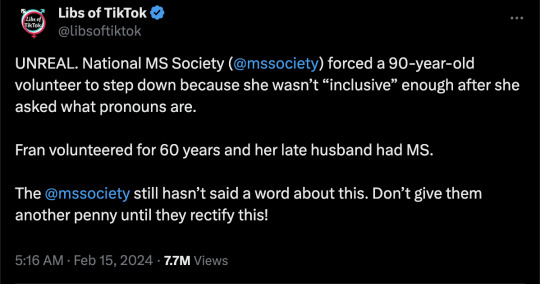
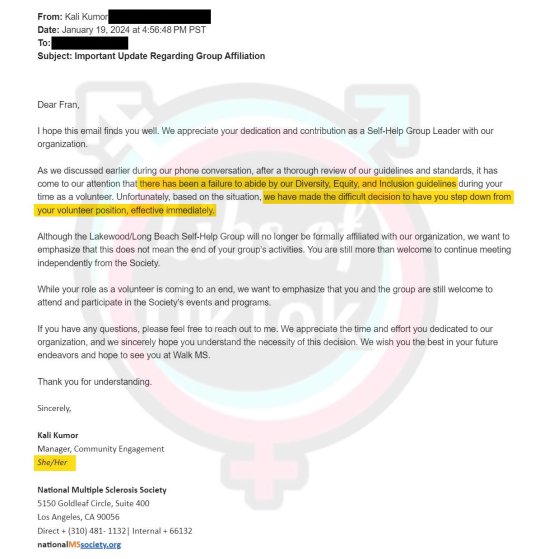

youtube

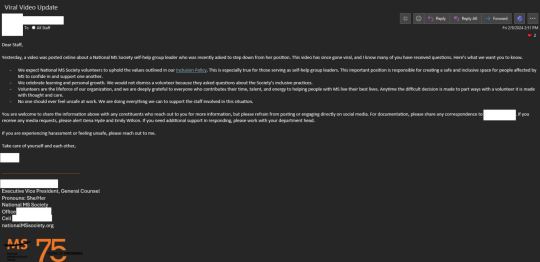


Kali Kumor is the stupid little girl who removed a woman who had dedicated her life, and worked longer than this vacuous apparatchik has been alive, to helping others.



One supposes that all the MS in the world has been cured, given how eager they are to tell dedicated volunteers that they're no longer needed.
--
A few years ago, there was a fuss about atheists being turned away from volunteering activities.
This is the same principle: adherence to their dogmatic ideology supersedes what is supposed to be their organization's mission and purpose: their "telos". This is why you cannot have two "teloi." One will always win over the other.
This is what I mean by ideological capture. The telos of the MS Society is no longer services and support for those with MS, it's "Diversity, Equity and Inclusion." That's their number one objective. And that means pronoun-policing and excommunicating those who aren't part of the cult.
It would seem both humorous, being so petty and stupid, and sad, given Fran's long service to the organization, but as Andrew Doyle points out, it's more insidious than that. It's compelled speech. It's about punishing those who will decline to be part of - or even simply don't understand - the fundamentalist, puritan religious ideology these fanatics have adopted and imbued throughout the organization.
Just as you must testify to Jesus as your lord and savior in order to volunteer at a soup kitchen or to raise money for cancer, they will demand you adhere to the belief in gender thetans in mismatched meat prisons in order to volunteer for the MS Society. In the name of "Inclusion,"
As Fran mentions, the MS Society has always been inclusive, but what she doesn't understand is that it's now Inclusive™, a brand name which doesn't mean including as many people as possible but including as many members of their cult as possible.
They're not looking for behaviors - e.g. respect, tolerance, etc - they're looking for beliefs. Enforcing a particular ideological belief system. They don't care that you might be an atheist who subscribes to secular humanism, or you could be a Xian who believes we're all children of God, they want to make you believe what they believe.
Resist it. They'll try to act like you're just being unreasonable for a small accommodation, but they know that it's how they get you to start complying with their demands. Like Islam, it's one little thing at a time. Don't draw pictures of Muhammad, that's not a big ask is it? Then it's respecting the Quran, then it's not blaspheming Muhammad or Allah, and so on.
#Andrew Doyle#Fran Itkoff#Kali Kumor#MS Society#gender identity ideology#gender ideology#queer theory#pronoun culture#pronouns in bio#pronouns#volunteering#compelled speech#ideological conformity#religion is a mental illness
28 notes
·
View notes
Text
Jazmine Hughes who won a National Magazine Award for her profile on Viola Davis was forced to resign from the New York Times over her signing a letter of solidarity with Gaza

Jazmine Hughes, an award-winning New York Times Magazine staff writer, resigned from the publication on Friday after she violated the newsroom’s policies by signing a letter that voiced support for Palestinians and protested Israel’s siege in Gaza.
Jake Silverstein, the editor of The New York Times Magazine, announced Ms. Hughes’s resignation in an email to staff members on Friday evening.
“While I respect that she has strong convictions, this was a clear violation of The Times’s policy on public protest,” Mr. Silverstein wrote. “This policy, which I fully support, is an important part of our commitment to independence.”
Mr. Silverstein said Ms. Hughes had previously violated the policy by signing another public letter this year. That letter, which was also signed by other contributors to The Times, protested the newspaper’s reporting on transgender issues.
“She and I discussed that her desire to stake out this kind of public position and join in public protests isn’t compatible with being a journalist at The Times, and we both came to the conclusion that she should resign,” Mr. Silverstein wrote in his note on Friday.
Ms. Hughes declined to comment. A Times spokeswoman had no further comments. Hughes joined The Times in 2015 and worked as an editor and writer for the magazine. In 2020, she won an American Society of Magazine Editors Next award for journalists under 30. This year, she won a National Magazine Award for profile writing, for articles on Viola Davis and Whoopi Goldberg.
The petition Ms. Hughes signed about the Israel-Hamas war was published online last week by a group called Writers Against the War on Gaza.
The group, which describes itself as “an ad hoc coalition committed to solidarity and the horizon of liberation for the Palestinian people,” denounced what it described as Israel’s “eliminationist assault” on Palestinians as well as the deaths of journalists reporting on the war. It was signed by hundreds of people, including other well-known journalists and authors.
“We stand firmly by Gaza’s people,” the letter said.
On Friday, a contributing writer at the magazine who had also signed the letter, Jamie Lauren Keiles, said in a post on X that he would no longer contribute to the publication. He said it was “a personal decision about what kind of work I want to be able to do.”
35 notes
·
View notes
Text
September 16, 2023 10:00 am Oklahoma time.
Our MS Journey: A Black MS Community part 1 of 2.
Title: MS Diagnosis In The Black Community
Speaker: Dr. Tirisham Gyang, Ohio State.
Host: The National MS Society
0 notes
Text
Deal
Don't mind me, thinking about "voluntarily" acquisitions.
Content: BBU setting, blackmail, threat of deportation, abuse of office, implied dubcon.
The man sitting across from her in the tiny interrogation room frowns at her, a look filled with grave seriosity. It's ridiculous. The only reason that Morva doesn't break into laughter is that she's a better actor than him. She is, in fact, fantastic.
It's not her skill who has brought them here; it's fucking Eddie's failure. It's not the first time she needs to get out of somebody else's mess. Morva will manage. She always does.
And step one is, do not laugh in the face of a small officer in a too large suit, who pretends to give a shit.
"I've looked into your files, Ms Gholamali. It doesn't look good."
She raises an eyebrow, a hint of amusement that she doesn't feel. He's not supposed to know that name. "I am sorry," she says. "There must be a mix up. My name is Mary Ann Ellis. I'm American."
"No, you're not." There's a smugness in his smile, and this time, he's dropped the act.
Well. Fuck.
"Morvarid Gholamali. It was your birthday yesterday. 20 years old. Quite the impressive criminal record, given how short you've been in the US. Illegally."
She doesn't flinch. Just tiredly rolls her eyes and lifts her cuffed hands. "Sir," she says with a bored voice. "That's ridiculous. I'm from Maine. I don't even know how to pronounce that name you just said. Where is it even from?"
"Iran." The man gives a thin lipped smile. "You'll hear the proper pronounciation of that name soon enough. Regardless of what you say, paperwork is being processed right now. You'll be deported."
"I don't-"
"Ms Gholamali", he interrupts her.
"Ms Ellis," she corrects automatically. His Persian proununciation is a nightmare. Still, she'll prefer hearing it from him than from an Iranian border officer. Fuck. This is taking a turn she does not appreciate.
The man goes on, unimpressed. "You're a criminal. A plain boring little thief. I bet you call yourself con artist, somewhere in your head, because you fucked your victims before robbing them, but you're not special in any way. You're a criminal, you're an illegal immigrant, and we don't want you here."
Behind her fake, confused smile, Morva grits her teeth. That asshole didn't talk about the fucking part by chance, she's sure of it. Her toolbox is a lot larger than that. If he mentions sex, he wants to get somewhere with it.
Fine. She's fucked men for way less than her own fucking chance at freedom.
"I'm American," she insists, still. "You can't deport me."
"You know.... An American would have other options," he says slowly. Almost thoughtful. Almost like he didn't plan this thing from the fucking start. "Do you know WRU?"
This does catch her off guard. "WRU? The... The pet distributors?"
"They have a program for people facing jail time to sign up, as part of their sentence." The man smiles. She hates that for a second, she doesn't even want to punch him. She wants to hear him out. He nods. "They could stay here, be reeducated, do a service to society again, in a way. Get assigned an owner, live with them, be-"
"Be a pet."
"Be in America."
She swallows, as he holds her gaze and goes on talking.
"So... Hypothetically. If I were to believe you, disregard all the talk about Ms Gholamali - would the American national Ms Mary Ann Ellis take this option?"
Her mind is racing. It can't be that bad now, can it?
She's been acting all her life, she's degraded herself so often to play a role, seduced men to get into their homes and wallets. She could become a pet, sure. She'd find a way to get out of it on the other side. She could, here. She couldn't, back home.
"Ms Ellis would certainly consider it," Morva says softly, looking down at her handcuffs and back at him through her lashes. "If only you were to believe her identity."
He smirks and raises an eyebrow, gaze wandering down her body slowly. "Interesting."
It's almost a relief. This is something she understands. A game she's played hundreds of times. Never as desperate. But always successful.
She can do this.
"Is... Is there something I could do to convince you?" She bites her lip. "Sir?"
"You know what?" He chuckles and leans in, loosens his tie with his free hand. "I think there is."
25 notes
·
View notes
Text
Good news for women!
By Cecilia Macaulay
BBC News
Sierra Leone has passed what has been described as a "ground-breaking" law to improve women's rights.
President Julius Maada Bio made an apology to women for their poor treatment in the past: "For so long we haven't been fair to you," he said.
The law states that 30% of public and private jobs must be reserved for women.
The Minister of Gender and Children's Affairs says women have been "crying" out "for years" for this change.
"It means a lot to women in Sierra Leone," Manty Tarawalli told the BBC's Newsday radio programme, adding that no other sub-Saharan African country had passed such a law.
The law lets girls who are still at school know "there are opportunities for them in Sierra Leone for employment for business" and for them to contribute to the economy, Ms Tarawalli said.
Under the new Gender Equality and Women's Empowerment Act (GEWE), women also benefit from ringfenced senior positions in the workplace, at least 14-weeks of maternity leave, equal access to bank credit and training opportunities.
There are harsh repercussions for employers who do not stick to the new gender ratios, including hefty fines of £2,000 ($2,500), and even potential prison time for institutions like banks that do not give women fair access to financial support. It is thought this will make it easier for women to start their own businesses.
The government says the employment law will apply to any business with more than 25 employees, but a final decision has not yet been made.
Ms Tarawalli said the move was "important" but that "more steps will have to be taken before the country can say fairness has been achieved across the genders".
Discrimination against women in the workplace is a "big issue," according to the minister, and the new law will "change the status quo," she said.
For Sierra Leone to become a middle-income country it must engage the 52% of the population who are women in the economy, Ms Tarawalli added.
Prior to the law, the United Nations sexual and reproductive health agency (UNFPA) said that "progress has been made in expanding opportunities for women and girls" but warned that "gender inequality and denial of women's rights are still prevalent at all levels in Sierra Leonean society".
As for gender equality in the continent as a whole, UN Women also says thatprogress has been made, but "the majority of women work in insecure, poorly paid jobs, with few opportunities for advancement".
#Sierra Leone#President Julius Maada Bio#Jobs reserved for women#Minister of Gender and Children's Affairs#Gender Equality and Women's Empowerment Act (GEWE)#14 week maternity leave#Equal access to bank credit#Jail men who don’t give women fair access to financial support
204 notes
·
View notes
Note
And what about the more historically intolerant nation of Yakyakistan and the failed state of Griffonstone, Madame President? Are you not concerned about their people wanting revenge for the racial inquisition in Equestria?
You might want to find out who rules those lands and organize a face to face meeting with Ember to discuss how Equestria will change and how the living victims and families of the dead will be compensated.
You will need Ambassadors you can trust to represent our people in friendship.

You forget yourself Ms. Silver Spoon, Remember, my world is different than the one you are familiar with.
The Yaks aren't as intolerant of other creatures as you think. While yes, I admit they are a quite stubborn nation at times, over the years thanks to the efforts of Pinkie Pie, or as they call her fondly "Pink Pony", the Yaks have become the friendliest nation to other creatures, even surpassing Equestria. They frequently provide Asylum to any creature that comes to them for protection, and make sure no harm comes to "Honorary YakYakistanians". As far as Griffonstone, Dashie was able to successfully integrate Friendship into their society thanks to her friendship with Gilda, and the crusader's/spike's friendship with Gabby. Griffonstone is now as prosperous as it was in the days of King Grover. I am making efforts to reach all nations, I just need to wait for Lavender to organize the diplomatic summit. ✨
10 notes
·
View notes
Text
Vietnam Relied on Environmentalists to Secure Billions. Then It Jailed Them.
The government is preparing to present its energy transition plan at the U.N. climate talks as it intensifies a crackdown on environmental advocates.

(Solar panels at the Sao Mai power plant in An Giang Province, Vietnam, last year. The country has been awarded $15.5 billion in grants and loans in exchange for a commitment to renewable energy)
By Sui-Lee Wee Nov. 28, 2023, 5:01 a.m. ET
When Vietnam was awarded a multibillion-dollar deal by a group of nine wealthy nations last year to work on reducing its use of coal, it agreed to regularly consult with nongovernmental organizations.
Instead, the government has arrested several prominent environmentalists from those organizations who shaped policies that helped secure the funding, prompting concerns over sending money to countries that have violated human rights.
As the country prepares to announce how it will spend the money at the United Nations climate talks that begin on Thursday, activists are saying that Vietnamese officials need to be held accountable for what they are calling a harsh crackdown against those who speak out about the country’s environmental woes.
Ngo Thi To Nhien, the director of an energy think tank, was the sixth environmental campaigner to be detained in the past two years.
She had met with officials from the Ministry of Natural Resources and Environment in March to discuss a plan for the climate deal, the Just Energy Transition Partnership, an effort among the United States, Japan and other developed countries to persuade developing economies to abandon coal. The nine nations had announced in December that Vietnam would receive $15.5 billion in grants and loans in exchange for a commitment to renewable energy.
Ms. Nhien, 48, never got the chance to see Vietnam present the plan. She was arrested in September and remains in a detention center on a charge of “appropriating documents of agencies and organizations.”
The other five who were detained were charged with tax evasion, which rights groups say are trumped-up accusations in response to their advocacy. Four were tried in closed hearings that lasted less than a day each, and given jail time, punishments more severe than the norm. While two activists have since been released, the United Nations high commissioner for human rights said in September that the “prosecutions and the arbitrary application of restrictive legislation are having a chilling effect” on environmentalists in Vietnam.
Activists and academics say that Vietnam appears to be emboldened by its growing importance to the West and has taken the opportunity to clamp down, knowing there will be few repercussions. The country has presented itself as an increasingly important geopolitical player, and one of the few Southeast Asian nations that has publicly pushed back against China. President Biden visited Vietnam in September, elevating ties to a new strategic relationship that he said would “be a force for prosperity and security in one of the most consequential regions in the world.”
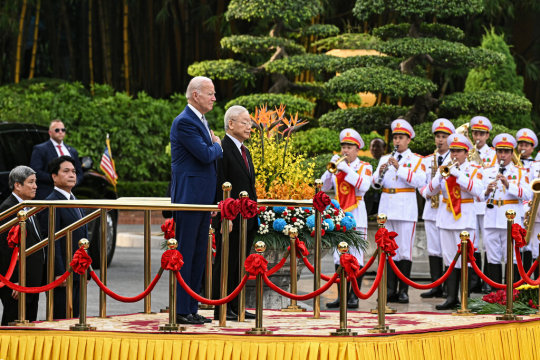
(President Biden and Nguyen Phu Trong, the general secretary of the Communist Party of Vietnam, at a welcome ceremony in Hanoi in September)
“We’re dealing with a juggernaut,” said Phil Robertson, the deputy director of Human Rights Watch’s Asia division. “They have run the table on the international community, and they’re continuing to do so.”
He pointed to Vietnam’s invitation to the Group of 7 summit this year, its inclusion on the Human Rights Council and now the funding from the Just Energy Transition Partnership, despite the country’s troubling human rights record.
Since 2016, when Nguyen Phu Trong, the general secretary of the Communist Party of Vietnam, was re-elected, the space for civil society has shrunk immensely. The country has the second-highest number of political prisoners in Southeast Asia, with more than 160 people currently detained for exercising their basic rights, according to Human Rights Watch.
The authorities in Vietnam have long persecuted people who are viewed as overt threats to one-party rule. But Mr. Trong’s administration has gone much further, targeting people who were previously given some room to operate.
Vietnam rejects any suggestions that the prosecutions are politically motivated. Pham Thu Hang, a spokeswoman for the Vietnamese foreign ministry, said last month that the environmentalists’ cases were “investigated, prosecuted and tried in accordance with the provisions of Vietnam law.”

(An electric vehicle charging station in a Hanoi parking garage. Nine wealthy nations announced in December that Vietnam would be the recipient of funding to facilitate its energy transition)
All six ran organizations that were outspoken about the country's environmental problems. That advocacy ultimately put them on a collision course with the Communist Party.
Their detentions are a signal that the government wants the energy transition to be carried out on its own terms and not on the advice of groups they have long deemed suspicious, said Nguyen Khac Giang, a visiting fellow at the ISEAS-Yusof Ishak Institute, a research organization in Singapore.
On the day Ms. Nhien was detained, Nhan Dan, the official newspaper of the Communist Party, criticized foreign donors who had funded policy research, saying they had directed groups to publish reports with “one-sided, negative content, tarnishing the situation of the country and the people of Vietnam.”
Vietnam, a manufacturing powerhouse that is home to nearly 99.5 million people, is the ninth-largest coal consumer globally. In 2021, Prime Minister Pham Minh Chinh vowed that the country would phase out coal consumption by 2040.

(A coal company in Quang Ninh Province, in northeast Vietnam. The country is the ninth-largest coal consumer globally)
The Just Energy Transition Partnership was first awarded to South Africa in 2021 as part of an effort by wealthy countries to address longstanding inequities in tackling climate change. Activists now see Vietnam as a litmus test for future agreements. Should other repressive governments be given billions of dollars? Should there be specific requirements for countries that receive funding but have poor human rights records?
Several countries behind the climate deal have expressed concern about the detentions in Vietnam, but rights groups say those nations need to predicate their financial support on the release of the environmentalists or a pledge from the government that there will not be additional arrests. So far, the countries have been unwilling to do so, said Ben Swanton, a director at The 88 Project, a U.S.-based nonprofit that focuses on human rights issues in Vietnam.

(Dang Dinh Bach, 45, ran a law and policy research center before he was arrested in 2021.)
In one of the harshest penalties in Vietnam for someone convicted of tax evasion, Dang Dinh Bach, 45, was given a five-year sentence in January 2022. He ran a law and sustainable development policy research center that provided legal aid to communities.
Mr. Bach refused to plead guilty. Tran Phuong Thao, his wife, said that she was not allowed to attend his trial and that he has been assaulted in prison by police officers.
“People like my husband have made great efforts to support the government and give suggestions on energy transition policies,” Ms. Thao said.
The arrest of Ms. Nhien, the think tank director, was particularly unusual because she was not a government critic. She led the Vietnam Initiative for Energy Transition Social Enterprise, the first group in the country to specialize in energy transition.
A former civil servant, Ms. Nhien had worked as a consultant at the World Bank and the Southeast Asia Energy Transition Partnership, a program managed by a U.N. infrastructure agency. She championed policymaking based on scientific evidence and was invited in May to speak to the Ministry of Science and Technology of Vietnam. In June 2020, she organized a workshop on integrating renewable energy sources into the country’s grid, presenting information from the state electricity utility.
That was enough to make her a target. On Sept. 15, four days after Mr. Biden left Vietnam, she was detained. The Ministry of Public Security pointed to the workshop as evidence of her “appropriating internal documents.”
Two weeks later, a court in Ho Chi Minh City sentenced Hoang Thi Minh Hong, 51, one of Vietnam’s best-known environmentalists, to three years in prison for tax evasion.

(Hoang Thi Minh Hong, one of Vietnam’s best-known environmentalists, was sentenced to three years in prison for tax evasion)
Ms. Hong’s husband, Hoang Vinh Nam, called his wife’s trial a sham and said the tax department did not send anyone to testify against her. When her peers started being arrested two years ago, Ms. Hong called the tax bureau to ask whether she owed anything and was assured that she did not, he said.
In December, Ms. Hong decided to shut down her environmental nonprofit, citing government pressures. She was arrested in May.
12 notes
·
View notes